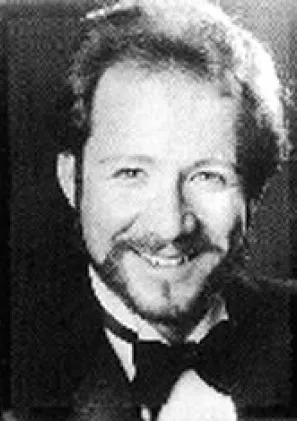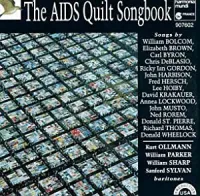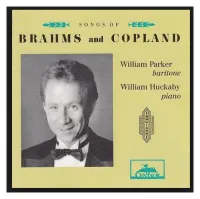Biography
1943 - 1993
Baritone William Parker was born on Aug. 5, 1943, in Butler, Pa. He received a bachelor's degree in German language and literature at Princeton in 1965. In the late 1960s, after five years in the Army Chorus, Parker started to study voice seriously. Although his career was on a steady rise throughout the 1970s, Parker seemed to burst onto the music scene in 1979, when he won first prize at the Kennedy Center-Rockefeller Foundation International Competition for Excellence in the Performance of American Music. Although best known for his recitals, Parker appeared with many opera companies in the United States and Europe. He made his New York City Opera debut in Massenet's "Cendrillon" in 1984 and was highly regarded for his portrayal of Papageno in Mozart's "Magic Flute" the same season. Parker's final project was conceiving and organizing The AIDS Quilt Songbook, a singer’s response to the epidemic. Diagnosed with HIV in 1986, Parker was dissatisfied with how the AIDS epidemic was treated within the musical community, particularly well-meaning benefit concerts which featured a standard repertoire that did not mention HIV. Inspired by the book Poets for Life, Parker contacted prominent composers to write songs inspired by the experiences of those impacted by AIDS. Among those who responded were Ned Rorem, Ricky Ian Gordon, William Bolcom, John Harbison, Lee Hoiby, and David Krakauer. Like the AIDS Memorial Quilt, Parker envisioned the songbook as an expandable memorial project, with the song cycle evolving with each musical addition. The AIDS Quilt Songbook premiered on June 4, 1992 in New York City in Alice Tully Hall with Parker and three other baritones performing. Parker subsequently performed the cycle in several cities. After the AIDS Quilt Songbook’s premiere, Parker’s health deteriorated. Although wheelchair-bound towards the end, he managed to sing at several recitals. He died in his Manhattan home of AIDS on March 29, 1993 at age 49. As Parker wished, since his passing, additional composers have added to the songbook.
1943 - 1993
Baritone William Parker was born on Aug. 5, 1943, in Butler, Pa. He received a bachelor's degree in German language and literature at Princeton in 1965. In the late 1960s, after five years in the Army Chorus, Parker started to study voice seriously. Although his career was on a steady rise throughout the 1970s, Parker seemed to burst onto the music scene in 1979, when he won first prize at the Kennedy Center-Rockefeller Foundation International Competition for Excellence in the Performance of American Music. Although best known for his recitals, Parker appeared with many opera companies in the United States and Europe. He made his New York City Opera debut in Massenet's "Cendrillon" in 1984 and was highly regarded for his portrayal of Papageno in Mozart's "Magic Flute" the same season. Parker's final project was conceiving and organizing The AIDS Quilt Songbook, a singer’s response to the epidemic. Diagnosed with HIV in 1986, Parker was dissatisfied with how the AIDS epidemic was treated within the musical community, particularly well-meaning benefit concerts which featured a standard repertoire that did not mention HIV. Inspired by the book Poets for Life, Parker contacted prominent composers to write songs inspired by the experiences of those impacted by AIDS. Among those who responded were Ned Rorem, Ricky Ian Gordon, William Bolcom, John Harbison, Lee Hoiby, and David Krakauer. Like the AIDS Memorial Quilt, Parker envisioned the songbook as an expandable memorial project, with the song cycle evolving with each musical addition. The AIDS Quilt Songbook premiered on June 4, 1992 in New York City in Alice Tully Hall with Parker and three other baritones performing. Parker subsequently performed the cycle in several cities. After the AIDS Quilt Songbook’s premiere, Parker’s health deteriorated. Although wheelchair-bound towards the end, he managed to sing at several recitals. He died in his Manhattan home of AIDS on March 29, 1993 at age 49. As Parker wished, since his passing, additional composers have added to the songbook.
Demography
Demography
Gender Male
Sexual Orientation Gay
Gender Identity Cisgender
Ethnicity Caucasian/White
Nations Affiliated United States Germany
Era/Epoch AIDS Era (1980-present) Information Age (1970-present)
Field(s) of Contribution
Art, Music, Literature & Theater
Music
US History
Commemorations & Honors
Butler Rotary Club and the Butler Symphony Association Native Son Honoree
Kennedy Center-Rockefeller Foundation International Competition for Excellence in the Performance of American Music First Prize (1979)
Demography
Gender Male
Sexual Orientation Gay
Gender Identity Cisgender
Ethnicity Caucasian/White
Nations Affiliated United States Germany
Era/Epoch AIDS Era (1980-present) Information Age (1970-present)
Field(s) of Contribution
Art, Music, Literature & Theater
Music
US History
Commemorations & Honors
Butler Rotary Club and the Butler Symphony Association Native Son Honoree
Kennedy Center-Rockefeller Foundation International Competition for Excellence in the Performance of American Music First Prize (1979)


